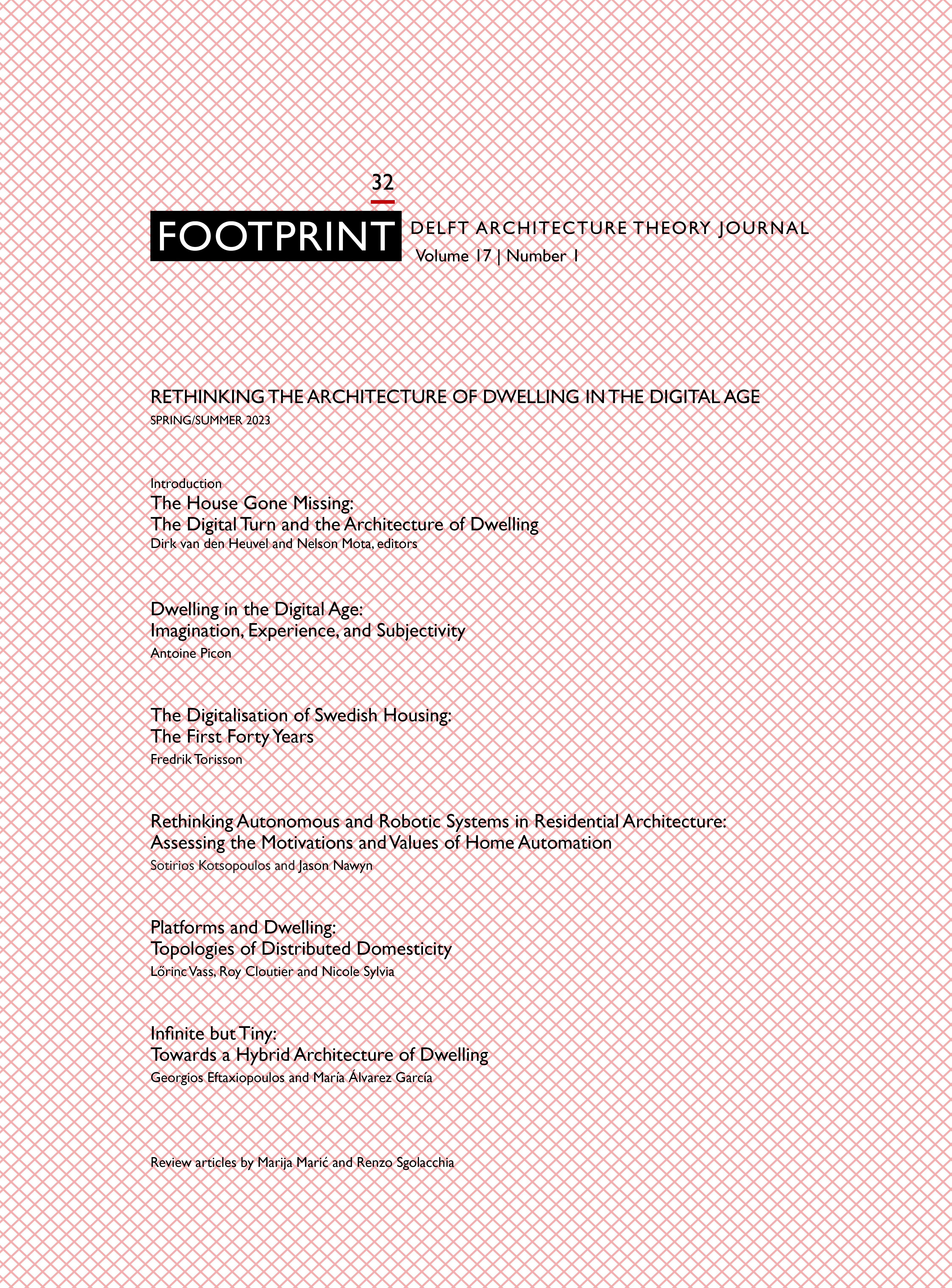Housing for a Lonely Generation
Co-Living Platforms and the Real-Estate-Media Complex
DOI:
https://doi.org/10.7480/footprint.17.1.7036Abstract
Organised around the advertising language for three co-living platforms—WeLive, Quarters (now Habyt), and the Collective—this essay frames the corporate housing model as inseparable from the digital media infrastructures that distribute its contents. Building, on one side, upon the existing research in the domain of housing, real estate, and media, and on the other, on the performative reading of the real estate advertisements of the contemporary co-living projects, it positions this housing typology as a genuine product of the 'real-estate-media complex,' referring to the close entanglements of speculative property markets, media infrastructures, and digital technologies in commodification of housing.
References
Appadurai, Arjun. “Disjuncture and Difference in the Global Cultural Economy.” Public Culture 2, no. 2 (1990): 1–24.
Borasi, Giovanna. “Attention to New Sites for Architecture.” In A Section of Now: Social Norms and Rituals as Sites for Architectural Intervention, edited by Giovanna Borasi, 7–36. Montreal: Canadian Centre for Architecture, 2021.
Bueno, Claudio Celis. The Attention Economy. Labour, Time and Power in Cognitive Capitalism. Rowman & Littlefield, 2017.
Fields, Desiree, and Dallas Rogers. “Towards a Critical Housing Studies Research Agenda on Platform Real Estate.” Housing, Theory and Society, 2019.
Fields, Desiree. “Automated Landlord: Digital Technologies and Post-Crisis Financial Accumulation.” Economy and Space 0, no. 0 (2019): 1–22.
Frichot, Hélène, and Helen Runting. “In Captivity. The Real Estate of Co-Living.” In Architecture and Feminisms: Ecologies, Economies, Technologies, edited by Hélène Frichot, Catharina Gabrielsson, and Helen Runting, 140–49. London and New York: Routledge, 2018.
Frichot, Hélène, and Helen Runting. “The Promise of a Lack: Responding to (Her) Real Estate Career.” The Avery Review, no. 8 (May 2015). http://averyreview.com/issues/2/the-promise-of-alack.
Frichot, Hélène, Catharina Gabrielsson, and Helen Runting, eds. Architecture and Feminisms: Ecologies, Economies, Technologies. London: Routledge, 2017.
Hayles, Katherine E. “Print Is Flat, Code Is Deep: The Importance of Media-Specific Analysis.” Poetics Today 25, no. 1 (2004): 67–90.
Marić, Marija. “Real Estate Fiction. An Outline for a New Literary Genre.” Thresholds, The MIT Press, no. 46 (2018): 320–27.
Marić, Marija. “Real Estate Fiction. Branding Industries and the Construction of Global Urban Imaginaries.” Doctoral Dissertation, ETH Zurich, 2020.
McGuirk, Justin. “Honeywell, I’m Home! The Internet of Things and the New Domestic Landscape.” In Housing After the Neoliberal Turn:, edited by Stefan Aue, Jesko Fezer, Martin Hager, Christian Hiller, Nikolaus Hirsch, Anne Kockelkorn, and Reinhold Martin, 47–52. Wohnungsfrage. Berlin and Leipzig: Haus der Kulturen der Welt and Spector Books, 2015.
Morozov, Evgeny, and Francesca Bria. Rethinking the Smart City. Democratizing Urban Technology. City Series. New York: Rosa Luxemburg Stiftung, 2018.
Rose M., Carol. “Property as Storytelling: Perspectives from Game Theory, Narrative Theory, Feminist Theory.” In Property and Persuasion: Essays on the History, Theory, and Rhetoric of Ownership, edited by Carol Rose M., 25–45. New Perspectives on Law, Culture, and Society. Colorado: Westview Press, 1994.
Runting, Helen, and Hélène Frichot. “Welcome to The Promenade City: A Gentri-Fictional Cartography of Stockholm in the Postindustrial Age.” Architecture and Culture 3, no. 3 (September 2, 2015): 397–411.
Shaw, Joe. “Platform Real Estate: Theory and Practice of New Urban Real Estate Markets.” Urban Geography, 2018, 1–27.
Srnicek, Nick. Platform Capitalism. Cambridge: Polity Press, 2017.
Steyerl, Hito. “In Defense of the Poor Image.” E-Flux Journal, no. 10 (November 2009). http://www.e-flux.com/journal/10/61362/in-defense-of-the-poor-image/.
Throgmorton, James A. “Planning as Persuasive Storytelling in the Context of ‘the Network Society.’” Planning Theory 2, no. 2 (July 2003): 125–51.
Tsing, Anna. Friction. An Ethnography of Global Connection. Princeton and Oxford: Princeton University Press, 2005.
Vanolo, Alberto. City Branding: The Ghostly Politics of Representation in Globalising Cities. New York and London: Routledge, 2017.
Williamson, Judith. Decoding Advertisements: Ideology and Meaning in Advertising. London: Marion Boyars, 1978.
Downloads
Published
Issue
Section
License
Copyright (c) 2023 Marija Maric

This work is licensed under a Creative Commons Attribution 4.0 International License.
- Authors retain copyright and grant the journal right of first publication with the work simultaneously licensed under a Creative Commons Attribution License that allows others to share the work with an acknowledgement of the work's authorship and initial publication in this journal.
- Authors are able to enter into separate, additional contractual arrangements for the non-exclusive distribution of the journal's published version of the work (e.g., post it to an institutional repository or publish it in a book), with an acknowledgement of its initial publication in this journal.



